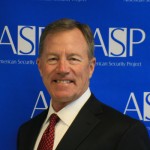The US military recognizes the effects of climate disruption are an”accelerant of instability,” which exacerbates security threats around the world. More frequent extreme weather events, food scarcity, water insecurity, and sea level rise will destabilize societies especially in countries where governments are not prepared to deal with the threats. How countries respond to increased instability will determine whether climate change will lead to war.
North Carolina is home to a number of combat units who are often the first to deploy in crisis and conflict. As a result, our military families and communities will be some of the first to feel the effects of climate change as US troops are deployed in response to disasters and conflicts exacerbated by climate change. Join ASP’s Brigadier General Stephen Cheney, USMC (ret.) for a discussion on how the U.S. military is preparing to deal with climate disruption and what that means for both our national and global security.
Date: May 24, 2018
Location: Hilton Charlotte City Center, Charlotte, NC
Time: 12:00pm
Cost: $50 WACC Member Rate; $65 Non-Member Rate; $35 TMS/Educator/Student Member Rate
RSVP Here
Speaker Biography:
Brigadier General Stephen Cheney, USMC (Ret.)

BGen Stephen Cheney, USMC (Ret) is the Chief Executive Officer of the American Security Project (ASP).
He is a graduate of the U.S. Naval Academy and has over 30 years experience as a Marine. His career included a wide variety of command and staff positions with the operating forces and the supporting establishment. Gen. Cheney’s primary specialty was artillery, but he focused extensively on entry-level training, commanding at every echelon at both Marine Corps Recruit Depots, to include being the Commanding General at Parris Island. He served several years in Japan and has traveled extensively throughout the Middle East and Asia.
Other selected highlights of Gen. Cheney’s military career include tours as Deputy Executive Secretary to Defense Secretaries Cheney and Aspin; ground plans officer for Drug Enforcement Policy in the Pentagon; liaison to the Congressional Commission on Roles and Missions of the Armed Forces; and Inspector General of the Marine Corps.
Following retirement from the Marines, Gen. Cheney became the Chief Operating Officer for Business Executives for National Security (BENS), in Washington, D.C., and most recently was President/CEO of the Marine Military Academy in Harlingen, Texas.
Gen. Cheney is a graduate of the Marine Corps Command and Staff College, the National War College, and the University of Southern California. He was a military fellow at the Council on Foreign Relations in New York City, where he is a member. Additionally, he was also a member of the Secretary of State’s International Security Advisory Board and the Department of State’s Foreign Affairs Policy Board.
General Cheney has appeared on CNN, Fox, BBC, NPR, and Sky news, and many other stations worldwide discussing the national security implications of climate change and energy security. His television and public appearances include being on a panel with Vice President Al Gore on his 24 hours of Reality program; on AMHQ at The Weather Channel with Sam Champion; and on stage for Climate Week in New York City with Prime Minister Tony Blair, Richard Branson, and Secretary of State John Kerry. He has been quoted and had articles in Politico, Foreign Affairs, and The New York Times. In 2015 he was recognized by The Weather Channel as a member of the Climate 25 for his leadership in identifying climate change as a national and global security issue. He has spoken at the Chatham House in London, the Chicago Council on Global Affairs, and in over a dozen cities around the world on this topic. His most recent testimony (2017) was on energy security, climate change, and cyber in front of the Senate Committee on Energy and Natural Resources; the House Committee on Science, Space, and Technology; and the EPA.







